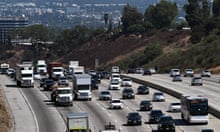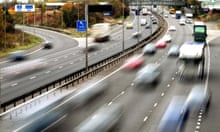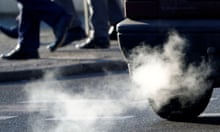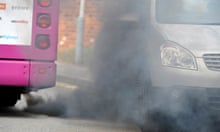London’s air is so polluted that motorists should be given up to £3,500 to persuade them to scrap their old diesel cars and vans and replace them with cleaner vehicles, according to the capital’s mayor, Sadiq Khan.
The nitrogen dioxide emitted by diesel cars is a key contributor to London’s poor air quality, which is so bad that City Hall now advises the public to avoid going out unnecessarily on the worst-affected days.
Khan is urging the government to introduce a scrappage scheme, costing an estimated £500m, that would offer incentives to low-income households and businesses to get rid of their older vehicles. He would also like to see the car tax redesigned so that it no longer gives drivers an incentive to choose a diesel car. “The toxic state of our air leaves us with no choice but to rid our city of the most polluting diesel vehicles. It is shocking that nearly half of new car sales in the UK are still diesel vehicles and the national system of vehicle excise duty still incentivises motorists to buy these polluting cars,” Khan said.
“I’m urging government to immediately review this policy, and today I’ve delivered a detailed report on how it can deliver an effective national diesel scrappage fund. One that both fairly compensates motorists and rapidly helps clean up our filthy air.
Air pollution causes 50,000 early deaths and £27.5bn in costs every year, according to the government’s estimates, and was called a “public health emergency” by MPs in April.
Policies, including those on vehicle excise duty, were tailored to incentivise drivers to choose diesel cars, when the carbon dioxide emitted by petrol cars was deemed the most dangerous pollutant because of its contribution to global warming.
But policymakers have become increasingly concerned about emissions of nitrogen oxides from diesels.
Under the mayor’s proposed scrappage scheme, van drivers in London would be given £3,500 towards the cost of a cleaner model, and low-income households could receive a credit worth £2,000 that they could use on alternative transport, such as joining a car pool, or on a new vehicle. Khan said that he had delivered the proposals to relevant ministers, including the chancellor Philip Hammond.
The package of measures could cost the Treasury more than £500m in London alone, but the government has made clear that it is considering taking tougher action to improve the capital’s air quality, and it has lost two recent court cases about the issue.
Ministers are also concerned about other sources of pollution, including from wood-burning stoves in homes.
Asked about air pollution in the capital by London MP Ruth Cadbury earlier this month, Theresa May said: “This government takes the issue of air quality very seriously. A lot of work has been done. Since 2011 more than £2bn has been committed to enable, for example, bus operators to upgrade their fleets, and to ensure that changes are made to reduce pollution from vehicles such as refuse trucks and fire engines. We do recognise, however, that more needs to be done”.
The prime minister added: “We will bring forward proposals to ensure that we can maintain the air quality that we all want to see.”
Khan said he had drawn up a series of policies to try to cut pollution in London, including plans for an ultra-low emission zone that he hopes to extend out as far as the north and south circular peripheral roads, and charges for the most polluting vehicles. But he said he does not have the powers to take more radical action. “The government needs to help us clean up the dangerous air in London,” he said.
City Hall believes a scrappage scheme could eventually be rolled out nationally, to help other cities tackle pollution problems. The Treasury introduced a nationwide car scrappage scheme during the 2009 recession, to prevent demand for cars drying up as consumer confidence plunged.
Gerry Keaney, chief executive of the British Vehicle Rental Leasing Association, said: “There is an urgent need to address pollution in our cities, which requires a change in the way we travel and the vehicles we use. We believe the mayor’s proposal for a national vehicle scrappage fund could make a significant contribution in reducing emissions by removing some of the oldest, most polluting vans and cars from our streets.”
The scheme, drawn up by Transport for London with the help of an economic consultancy, is designed to allow the government to fulfil its obligations under European law to clean up air quality.











Comments (…)
Sign in or create your Guardian account to join the discussion